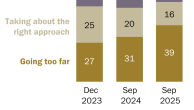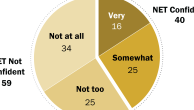Since the start of the Israel-Hamas war, several international actors have been working to broker peace, including Egypt, Qatar and the United States. Meanwhile, the war has paused normalization efforts with Saudi Arabia and increased military tensions with Iran.
Israelis broadly agree that the U.S. is helpful in working toward lasting peace between Israelis and Palestinians (81%) and that Iran is harmful (87%). Opinions on Egypt are split. Other international influences we asked about – including the United Nations – are seen as more harmful to peace efforts than helpful.
Though most see the U.S. as helpful, 50% of Israelis also say President Donald Trump favors the Israeli side too much in his foreign relations. Only 2% say he favors the Palestinian side too much, while 42% say he favors each side the right amount.
Looking to the future, four-in-ten Israelis think it is likely that the international community will recognize an independent Palestinian state in the next five years. About half (51%) think this is unlikely.
Views of international influences
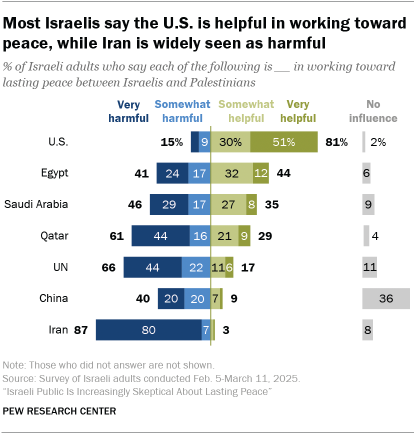
About eight-in-ten Israelis say the U.S. is helpful (81%) in the work toward lasting peace between Israelis and Palestinians, including 51% who say it is very helpful. Another 15% say the U.S. is somewhat or very harmful to peace efforts.
There is also broad consensus on Iran’s influence: 87% of Israelis say Iran is harmful in the work toward lasting peace. This includes 80% who say it is very harmful. (Since the start of the war, Iran has launched two major missile attacks on Israel in April and October 2024.)
The Israeli public is split on whether Egypt is helpful (44%) or harmful (41%). But twice as many say Egypt is very harmful as say it is very helpful (24% vs. 12%).
Roughly a third of Israelis (35%) say Saudi Arabia is helpful in working toward lasting peace (35%), while 29% say the same about Qatar. More believe these countries are harmful (46% and 61%, respectively), including 44% who say Qatar’s influence is very harmful.
About a fifth of Israelis say the United Nations is helpful to peace efforts, while 66% say it is harmful. Earlier in 2025, the Israeli government moved to ban UNRWA, the main UN aid agency in Gaza and the West Bank, arguing that employees of the organization have links to Hamas.
Around one-in-ten Israelis surveyed say China is helpful (9%) in working toward peace between Israelis and Palestinians. Israelis are about as likely to say China is harmful (40%) as they are to say it has no influence (36%).
Views by ethnicity
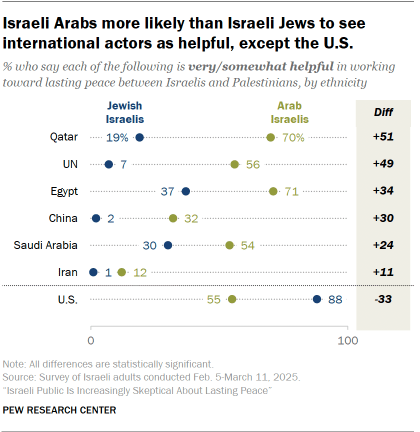
Large shares of Jewish and Arab Israelis agree the U.S. is helpful to peace efforts, though Jews are more likely to say this than Arabs (88% vs. 55%).
Israeli Arabs are more likely than Israeli Jews to see every other international actor we asked about as helpful, by a significant margin.
For example, seven-in-ten Arab Israelis see Qatar as helpful, compared with 19% Jewish Israelis – a difference of 51 points. Arabs are also far more likely than Jews to perceive a helpful influence from the United Nations (+49), Egypt (+34), China (+30) and Saudi Arabia (+24).
Small shares of Arab and Jewish Israelis see Iran as helpful, though Arabs are again more likely to say this than Jews (12% vs. 1%).
Views by ideology
Israelis on the left are more likely than those on the right to see various international actors as helpful in the work toward lasting peace.
The only exception is the U.S., which 67% of Israelis on the left see as very or somewhat helpful, compared with 85% of those in the center and 86% of those on the right.
Amid allegations of financial connections between aides close to Netanyahu and the Qatari government, just 11% of Israelis on the right – Netanyahu’s political base – see Qatar as helpful to peace efforts. Larger shares of those on the left (64%) and in the center (36%) say this.
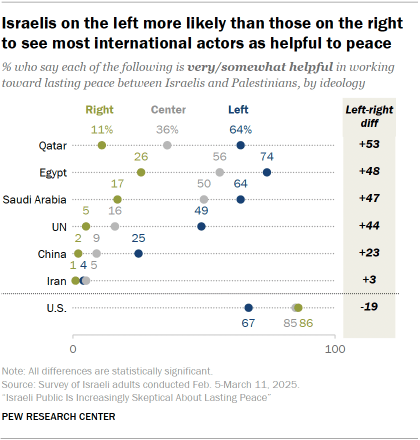
Around half or more on the left and in the center see Egypt and Saudi Arabia as helpful in working toward peace between Israelis and Palestinians. Roughly a quarter or fewer of right-leaning Israelis agree.
About half of left-leaning Israelis (49%) see the UN as helpful, while much smaller shares of Israelis in the center (16%) and on the right (5%) feel this way.
Israelis on the left are also more likely to say China is helpful (25%) than those in the center (9%) or on the left (2%). There is more agreement on Iran: 5% or fewer across the ideological spectrum say it is helpful in facilitating long-term peace, with right-leaning Israelis the least likely to say this.
Views of Trump’s approach to the conflict
Half of the Israeli public say U.S. President Donald Trump favors the Israelis too much in his foreign relations, while only 2% feel he favors Palestinians too much. Around four-in-ten (42%) say he favors each group the right amount.
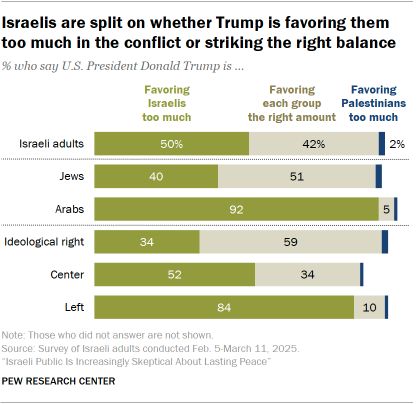
A year ago, 27% of Israelis said then-President Joe Biden was favoring Israelis too much, 25% said he favored Palestinians too much and 41% said he favored each group the right amount.
Related: How Americans view Israel and the Israel-Hamas war at the start of Trump’s second term
Roughly nine-in-ten Arab Israelis (92%) say Trump is favoring Israelis too much, while 40% of Jewish Israelis feel the same. Among Jewish Israelis, more say he’s favoring each group the right amount (51%) than favoring Israelis too much (40%).
Israelis on the ideological left are much more likely than those in the center or on the right to say Trump favors Israelis too much. About eight-in-ten left-leaning Israelis say this (84%), while 52% of those in the center and 34% of those on the right agree.
Likelihood of an internationally recognized Palestinian state

Around half of Israelis (51%) say it is somewhat or very unlikely that the international community will recognize an independent Palestinian state within the next five years, while 40% say this is likely.
Arab Israelis are almost twice as likely as Jewish Israelis (62% vs. 34%) to think the international community will recognize an independent Palestinian state in the near future.
More Israelis on the left (74%) than in the center (60%) or on the right (21%) expect the international community to recognize a Palestinian state.
And Israelis who say a way can be found for Israel and an independent Palestinian state to coexist peacefully are more likely to predict a state will be recognized in the next five years. About eight-in-ten Israelis who believe peaceful coexistence is possible say this (82%), compared with 19% of those who do not believe coexistence is possible.
